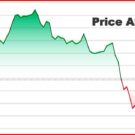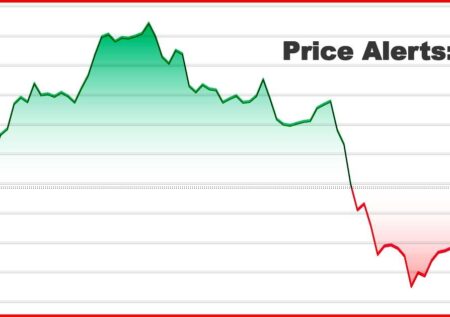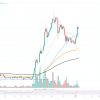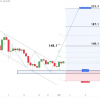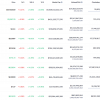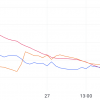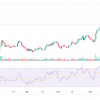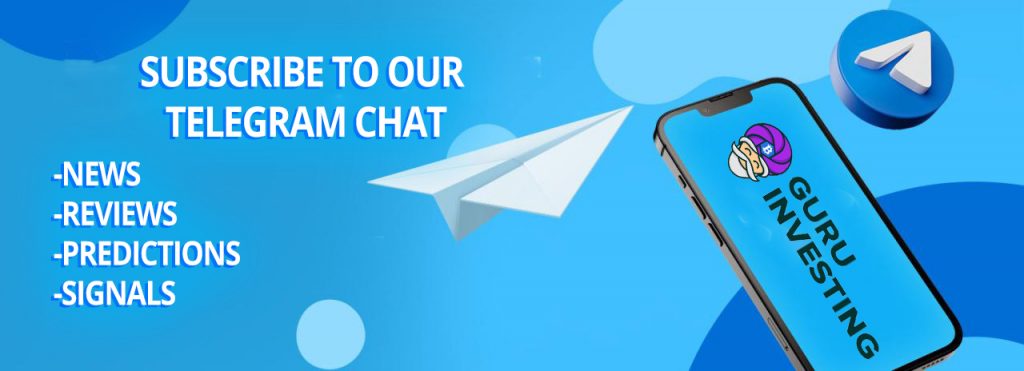Live QTUM price analysis
The current price of Qtum in real time is $3.27and its trading volume is equal to US$42,549,176 in the last 24 hours. QTUM price has grew by
2.17%
on the last day and increased by
1.17%
in the last 7 days. It is important to note that Qtum’s current market capitalization is US$342,275,451and the maximum offer is 107 822 406 KTUM coins. Speaking of revolving supplies, QTUM has 104 755 842 coins. Currently, Qtum’s market rating is #165.
Ktum price today
96.94%
below
always on top and that’s it
590.49%
higher
always at a low level.
All data and prices are updated in real time. The most active and popular exchanges for buying or selling KTUM are Binance, Kucoin & Kraken. Find more cryptocurrency exchange options on our Cryptocurrency exchange tracker. The most secure hardware wallets to store your cryptocurrency: Ledger And Trezor.
What is Qtum (QTUM)?
Qtum is a native token for the blockchain platform of the same name. It was designed as ERK-20 token. Ktum Network provides decentralized finance (DeFi) and blockchain development services, including dApps and non-fungible tokens (NFTs). This is a hybrid blockchain developed on Ethereum platform from a fork of Bitcoin Core.
The Qtum blockchain is decentralized, open source, and general purpose, allowing for greater flexibility in development. This aims to improve the programming and transaction mechanics used by Ethereum and Bitcoin. providing updated blockchain technology for smart contracts. You can use the above dynamic chart to study historical Qtum price data.
What is the history of Qtum?
The Qtum Foundation was founded in 2016 by a computer scientist. Patrick Dyeblockchain architect Neil Mahyand software engineer Jordan Earls. In the same year, the green light was given to the development of the Qtum crypto project.
Dai has worked on large-scale blockchain projects in China focused on Bitcoin mining. He also has experience as a product developer at e-commerce giant Alibaba. Mahi has over two decades of software development experience. Earls is a blockchain technology expert who specializes in token security and smart contract programming.
The purpose of Qtum is address some of the key challenges facing large-scale blockchain networks, Bitcoin (BTC) and Ethereum (ETH), in particular. Due to their size, these networks are often difficult to scale and can only be compatible if the user has wrapped tokens. Bitcoin also does not support smart contracts, which have become an integral part of DeFi.
Additionally, both networks use a Proof-of-Work consensus mechanism, which is expensive and resource-intensive. To counter this, the Qtum crypto platform was developed using a new version Proof of Stake (PoS)making it faster and more scalable while retaining the strengths of Bitcoin and Ethereum.
In March 2017, the Qtum team conducted initial coin offering (ICO), grossing approximately $15 million. The platform was officially launched in September of the same year. On launch day, Qtum was priced at just under $12. Although Qtum was originally created as an ERC-20 token, the platform converted it into a native asset once the mainnet went online.
The asset has been volatile since its inception, with very frequent price fluctuations. However, it does not strictly follow general market trends. The cryptocurrency reached its first significant peak in 2018. In January of that year, the price of QTUM surpassed $100 for the first time, although a few days later its value dropped by half.
In July 2022, the Qtum network successfully completed a hard fork. This was a must-have update that introduced new Taproot features, EVM updates in Berlin and London, and various system bug fixes. The network warned users that they would temporarily lose control of their coins if they did not upgrade their Qtum Core wallet.
How does Qtum work?
Qtum is a deflationary asset. Its maximum volume is 100,000,000 QTUM. The limited supply of tokens means that the price of Qtum will likely rise as supply dwindles. However, although the maximum offer is currently limited, it is not strictly limited and can be changed by a vote of management.
Like a hybrid blockchain, Qtum has the functionality of both Ethereum and Bitcoin.. The platform supports the development of DeFi solutions such as dApps and tokens. Developers can program their own smart contracts and create blockchain-based applications.
Qtum is a general purpose blockchain, meaning it is used to develop other blockchain-based applications and tools. Programming on Qtum is largely based on smart contracts and is enhanced by two new technologies:
- Account Abstraction Level (AAL) – a tool used to increase the output of unspent transactions (UTXO);
- Decentralized Governance Protocol (DGP) – a tool that adjusts the internal parameters of smart contracts.
Qtum uses an updated version of Bitcoin’s UTXO model. All transactions are performed using inputs (wallet addresses from which assets are sent) and outputs (addresses to which assets are sent). Bitcoin generally does not support smart contracts. Qtum’s UTXO has been configured using AAL to provide this support.
The account abstraction layer provides support for Turing complete smart contracts. Applications built on Qtum are compatible with EVM and can also be hosted on other virtual machines.. Since AAL supports a number of programming languages, including C and Python, it can be used to integrate non-blockchain applications with Qtum.
The decentralized governance protocol is a scalable solution that allows users to modify smart contracts without having to move away from the main blockchain. You can customize options such as block size or standard gas fee. Therefore, the price of QTUM services depends on the parameters of the smart contract.
Qtum uses a modified version of Proof-of-Stake known as Mutual Proof of Stake (MPoS) consensus algorithm to ensure network security and data integrity. While it is common for stakeholders to be selected as validators based on the number of tokens they have locked and the length of time they have been staked, in the case of MPoS, only quantity is a vital factor.
All rewards in MPoS networks are programmed to be proportional. This means that the amount of rewards users receive depends on the amount they bet. As with Bitcoin, the reward a validator can earn per block is halved every four years.
If the maximum supply of QTUM does not change, the block reward is expected to reach zero by 2045. However, the deflationary design of the cryptocurrency means that over time, the Qtum price value for the halved reward will also increase.
The community can also use Qtum coins to participate in a decentralized autonomous organization (DAO). The network uses a standard blockchain governance model, where users can submit proposals and vote on changes and updates to the protocol. This ensures decentralization of the blockchain and transparency of the project.
What is the Qtum trading volume in the last 24 hours?
QTUM has trading volume US$42,549,176 in the last 24 hours.
What is the highest price for Qtum?
QTUM has the highest price $106.88which was achieved at January 07, 2018 (6 years 1 month ago).
What is the lowest price for Qtum?
QTUM has the lowest price $0.4732which was achieved at December 11, 2022 (1 year 2 months ago).
Which exchanges are best for buying and selling QTUM?
Currently the most active and dominant exchanges for buying and selling Qtum are Binance, Kraken & Kucoin. The most popular Ktum trading pairs QTUM/KRW
(on
Upbit
),
QTUM/USDT
(on
Binance
),
QTUM/USDT
(on
Huobi Global
). Go to Catalog of crypto trades to access customized and exclusive discounts, vouchers and welcome bonuses from the most popular exchanges.
What are the safest hardware wallets for storing QTUM?
According to the process of in-depth analysis and testing, Ledger And Trezor are one of the most secure and popular hardware wallet options for storage Ktum. For exclusive discounts and promotions on the best crypto wallets, visit Catalog of crypto trades.
Qtum related pages
Read the hottest Crypto news.
Watch the animated crypt Video explanation.
Learn Cryptocurrency From scratch.
